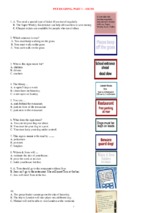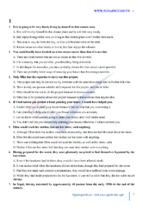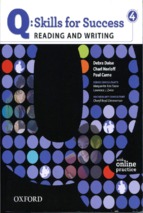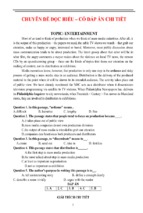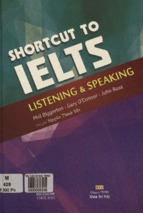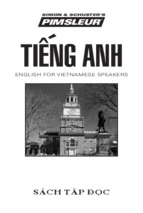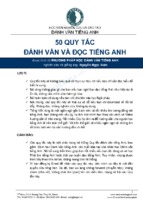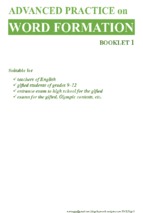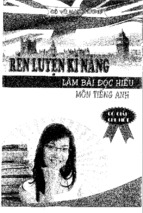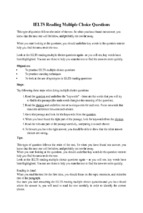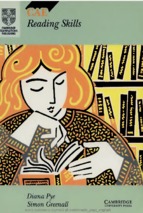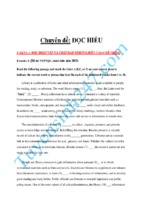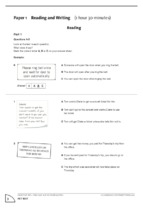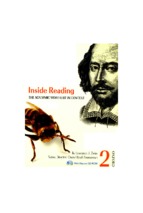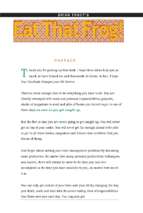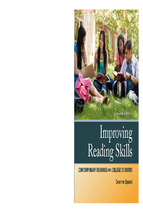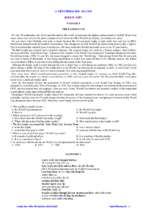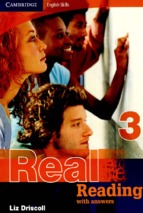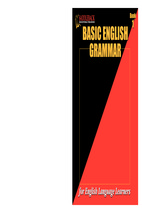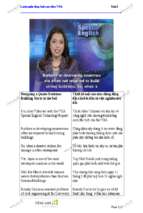Stories
for reading
comprehension 1
L A Hill
LONGMAN
INTRODUCTION
This is the first of a series of three books which have been
written to replace my Comprehension and Precis Pieces, and Further
Comprehension and Precis Pieces written with R. D. S. Fielden.
In this series of reading comprehension passages, the vocabulary and structures are carefully graded. The grading follows
that of the Longman Structural Readers. Book 1 of this series
covers Stages 1 and 2 of those readers; Book 2 covers Stages 2
and 3; and Book 3, Stages 4 and 5. Words outside the grading
are given at the end of each book.
In this series, the comprehension questions contain no composition element; the students simply have to choose between
alternatives which are supplied to them.
The series also contains grammatical exercises. The instructions for these sometimes contain words which are outside the
grading. They are therefore more suitable for class than private
use, unless the student has someone who can explain the difficult words. In a class, the teacher should explain such difficult
words to the students before asking them to do an exercise. In
nearly all the grammatical exercises, the student has to choose
between alternatives which he or she is given.
L. A. Hill
Mr Jones's shop sold food. Mr Jones and a young man worked
there. The young man's name was George.
A man came into the shop on Monday. He was a funny man.
Mr Jones was in the office. It was behind the shop. The funny
man looked at George and said, "I want a small table, please."
George said, "We don't sell tables in this shop. We sell
food."
The man smiled and answered, "A small, brown table." He
took a picture out of his bag and showed it to George. It was
a picture of a small, brown table.
George put his mouth near the man's ear and said, "We do
not have tables in this shop! Food! Not tables!"
The man smiled and answered, "That's good. Thank you."
Then he sat down on a chair and waited.
George was not happy. He went into the office and spoke
to Mr Jones. Then he and Mr Jones came out again.
Mr Jones was angry. He looked at the man and said, "What
do you want?"
The man smiled and answered, "I want a loaf of brown
bread, please. Haven't you got any bread in your shop?"
Mr Jones said, "Yes, we have." He looked at George, and
then he went and got a loaf of brown bread from a big box and
gave it to the man.
3
UNIT1
Exercise 1
Look at these questions. Find the right answers. Then write the
questions and the answers:
1 Did Mr Jones work in George's shop?
a) No, he didn't. b) Yes, he did.
2 Who worked in Mr Jones's shop?
a) A funny man did. b) George did.
3 Did the shop sell tables, or food?
a) It sold food. b) It sold tables.
4 Did the funny man ask George for some food?
a) No, he didn't. b) Yes, he did.
5 Did the funny man ask George for a table?
a) No, he didn't. b) Yes, he did.
6 Did George show him a table?
a) No, he didn't. b) Yes, he did.
7 Whose office did George go into then?
a) Mr Jones's. b) The funny man's.
8 Did Mr Jones speak to the funny man?
a) No, he didn't. b) Yes, he did.
9 Was Mr Jones happy, or angry?
a) He was angry. b) He was happy.
10 Did the funny man ask Mr Jones for a table, or some food?
a) A table. b) Some food.
Exercise 2
Write this story. Choose the right words each time:
Mr Jones sold (food/tables and chairs) in his shop. His shop was
(behind/in front of) his office. A (funny/young) man worked in
the shop too. (A/The) funny man came into the shop on Monday; He asked (George/Mr Jones) for a (chair/table). Then he
showed George a (picture of a table/table). George (did not
sell/sold) the funny man a small, brown table. The funny man
(smiled/was not happy). He sat down and (waited/was angry). Then
(George/the funny man) brought Mr Jones out of the (office/shop).
Mr Jones (smiled/was not happy). The funny man asked him for
a (loaf of brown bread/small, brown table), and Mr Jones gave (him
a big box/it to him).
4
UNIT 1
Exercise 3
Use a/an when we can count a thing, and some when we
cannot. Use an only when the next word begins with a,
e, i, a, or u, or an h which is not pronounced (e.g. an hour).
Look at these pictures. Put a, an, or some, in the empty places:
1 George is
eating . . .
meal. He is
putting . . .
food in his
mouth with
. . . fork.
2 Now
George is
putting . . .
butter on his
bread with . . .
knife.
6 There is . . .
5 This is . . .
glass. There is tea in this cup.
. . . milk in it. There is . ..
spoon in it.
3 This is . . .
4 This is . . .
loaf of bread. egg. It is in . . .
water.
There is . . .
cheese near it.
8 This is , . .
7 This is . . .
cup too. There picture of . . .
is . . . coffee in table.
it.
5
Gladys was at school in a small, quiet town in England. She
was sixteen years old, and her father and mother were poor,
and their house was very small.
Maisie was Gladys's friend. She went to that school as well.
Gladys said, "Maisie, I'm going to find a very rich man and I'm
going to marry him. Then I'm going to have a beautiful house
and a large garden, and a lot of clothes, and a lot of money."
Maisie smiled and said, "Where are you going to find a very
rich man, Gladys? There aren't any in our town."
But Gladys was a very pretty girl. Her eyes were blue, and
her hair was black and soft. She went to London, and then she
went to America. She found a tall, very rich man there, and she
married him. She was twenty-two years old then.
Then she and her husband went to England. They went to
Gladys's old house, and Maisie came there.
Gladys said, "I've married a very rich man, Maisie, and I've
got a beautiful house and a large garden and four gardeners.
And I've bought a lot of clothes and I have money as well. My
husband's got a plane too, and he flies it!"
Maisie said, "A lot of people have got planes and fly them,
Gladys."
"In their house?" Gladys asked.
6
UNIT 2
Exercise 1
Look at these questions. Find the right answers. Then write the
questions and the answers:
1
2
3
4
5
6
7
8
9
10
Were Gladys's father and mother rich?
a) No, they were not. b) Yes, they were.
Did Gladys want to work in her small, quiet town?
a) No, she did not. b) Yes, she did.
Who did Gladys want to marry?
a) A rich man. b) A tall man.
Were there any very rich men in Gladys's town?
a) No, there were not. b) Yes, there were a lot. c) Yes,
there were some.
Did Gladys marry in London, or in America?
a) In London. b) In America.
Was her husband a short man?
a) No, he was tall. b) Yes, he was.
Where did Maisie see Gladys again?
a) In America. b) In London. c) In their small town.
Whose house did they meet in?
a) Gladys's old house. b) Maisie's house.
Who flew the plane in this story?
a) Gladys did. b) Gladys's husband did.
Where did he or she fly it?
a) In the garden. b) In the house.
Exercise 2
Write this story. Choose the right words each time:
Gladys's school was in a (city/town/village), (and/but) Maisie's
was in a (city/town/village). Gladys lived in a (big/small) house.
She had (black/blue) eyes, (and/but) she was (beautiful/not beautiful). She went to America (after/before) she went to London. She
married a man in (America/London). Then she went back to England (with/without) her husband. She met Maisie there.
(Gladys/Maisie) had a very rich husband now. He had (a
plane/two planes). (A lot of people/He) flew (it/them) in their house.
7
UNIT 2
Exercise 3
We use the have/has done tense—the present perfect (e.g.
has been, have opened) when the result of the action is still
there; but we use the did tense — the past simple (e.g.
saw, opened) when it is not, or when the time at which it
happened is given.
Look at these examples:
Gladys has opened the
window. Look! It is open.
Gladys opened the window
at 2 o'clock, but now she has
shut it. Look! It is shut.
Put bought, has bought, came, has come, went, has gone, married,
has married, sold or has sold, in the empty places:
1 Gladys isn't here now. She
. . . to America.
2 This is America. Gladys
. . . here in 1981, and now
she . . . a tall, rich man.
3 Gladys . . . to America in
1981, but now she . . . back
to England. She is saying,
"This is Tom. We . . . in
America in 1982."
4 Tom . . . this car from a
man in January, but now he
. . . it to a lady. It isn't his
now.
8
Alan Smith's father bought him a small shop, and Alan sold
milk, butter, cheese, eggs and other tilings in it. His shop was in
a small town, and it was open on Tuesday, Wednesday, Thursday, Friday and Saturday, and on Sunday morning, but it was
shut on Sunday afternoon and on Monday.
Alan went to some farms on Monday and bought their best
butter and cheese and eggs from the farmers, but he bought
his milk in the town. A truck brought it to his shop in the
morning. Alan and his wife worked in the shop, and they sold
a lot of their food, because it was good and clean.
A fat woman came into the shop on Saturday. She bought
some eggs and some butter, and then she said to Alan's wife,
"Your eggs and your butter are dear today. Why are Saturday
and Sunday dearer than Tuesday, Wednesday, Thursday and
Friday?"
Alan's wife was unhappy. She looked at the fat woman, and
then she looked at Alan, but she did not give an answer.
Then Alan smiled and said, "Our food is not dearer on
Saturday and Sunday! It is cheaper on Tuesday, Wednesday,
Thursday and Friday!"
9
UNIT 3
Exercise 1
Look at these questions. Find the right answers. Then write the
questions and the answers:
1
Was Alan's shop open on Monday?
a) No, it wasn't. b) Yes, it was.
2
Was Alan's shop shut on Saturday?
a) No, it wasn't. b) Yes, it was.
3
Was Alan's shop open or shut on Sunday morning?
a) It was open. b) It was shut.
4
Who sold Alan cheese?
a) His father did. b) The farmers did.
5
Who brought Alan's butter to his shop?
a) A man in a truck did. b) Alan did.
6 Who brought milk to Alan's shop?
a) A man in a truck did. b) Alan did.
7
Why did a lot of people buy food from Alan?
a) Because he and his wife worked in the shop.
b) Because the food was clean and good.
8
Who answered the fat woman's question?
a) Alan did. b) Alan's wife did.
9
Was the answer an angry one, or a nice one?
a) It was a nice one. b) It was an angry one.
10
Was the food in the shop dearer on Friday or on Saturday?
a) It was dearer on Friday. b) It was dearer on Saturday.
Exercise 2
Write this story. Choose the right words each time:
(Alan/Alan's father) bought a shop for (him/his father). He (did not
sell any/sold) food in it, and it was open (every day/5.5 days) of the
week. Alan (bought/sold) tilings on Monday. The farmers
(bought/sold) him food (and/but not) milk on their farms. (He
brought them/They sold him) the best butter and cheese and eggs.
10
UNIT 3
The (food/milk) came to Alan's shop in a truck. Alan's wife (did
not work/worked) with him. (Alan and his wife were/Alan's food was)
good and clean. A fat woman came into the shop. Alan's wife
was unhappy because she (asked a question/was fat). (Alan's
wife/Alan) answered the question. The food in the shop was
(cheaper/dearer) on Saturday and Sunday.
Exercise 3
Use any in questions (e.g. "Have you got any butter?")
and in negative statements (e.g. "We haven't got any butter."), but use some when there is no question and no
negative (e.g. "We have got some butter.").
Put some or any in the empty places:
1 "Have you got . . . hard
cheese?"
"No, we haven't got . . .
hard cheese, but we have
got . . . . nice soft cheese."
2 "I want . . . eggs. Have
you got . . . brown ones?"
"Yes, we have got . . . nice
brown ones."
3 "You haven't got . . .
fruit."
"No, we don't have . . . fruit
here, but there are . . . oranges
and apples in that shop."
4 "Have you got . . . milk?"
"We haven't g o t . . . milk
now, but we're going to
have , . . bottles this
afternoon."
11
Mr and Mrs Brown had two daughters and two sons. Both the
daughters married, and then both the sons married too. Soon
Mr and Mrs Brown had a granddaughter, and then they had
two grandsons. They were very happy.
Then one of their daughters had another baby, and she telephoned her mother, "Please come and help with your new
granddaughter." Mrs Brown went quickly, but Mr Brown
stayed at home, because he was nearer his job there. But he
said, "I'll come on Friday evening, and I'll stay till Monday
morning."
On Friday evening, after work, Mr Brown got into a train.
He was very happy. "I'm going to see my new granddaughter
now," he said.
There were three empty places in the train. There was an old
man beside one empty place, and Mr Brown went to him and
said nicely, "Are you a grandfather?"
"Yes," the man answered, "I have three granddaughters."
Mr Brown went to the second empty place. There was a nice
woman beside that. Mr Brown said to her, "Are you a
grandmother?"
The woman answered, "Yes, I have two granddaughters and
two grandsons."
Mr Brown went to the third empty place. There was a man
beside that, and Mr Brown said to him, "And are you a
grandfather?"
"No, I'm not," the man answered.
Mr Brown smiled happily and said, "That's good." He sat
down in the empty place and said to the man kindly, "Now
I'll tell you about my granddaughters and grandsons."
12
UNIT 4
Exercise 1
Look at these questions. Find the right answers. Then write the
questions and the answers:
1 Did Mr and Mrs Brown have any children?
a) Yes, they had four. b) Yes, they had two.
2 Did their children marry?
a) No, they did not. b) Yes, all of them did.
two of them did.
c) Yes,
3 How many granddaughters did Mr and Mrs Brown have?
a) One. b) Two.
4 Did they have any grandsons?
a) No, they did not. b) Yes, they had two.
5 Who went and helped their daughter with her new baby?
a) Mr Brown did. b) Mrs Brown did.
6 Did Mr Brown go with his wife?
a) No, he did not. b) Yes, he did.
7 Why?
a) Because he was ill.
b) Because he had a job near his home.
8 When did Mr Brown go to his daughter's house?
a) On Friday evening. b) On Monday morning.
9 How did he go?
a) In a train. b) In his car.
10 What did he do all the time in the train?
a) He talked about his granddaughters and grandsons.
b) He listened to stories about other people's granddaughters and grandsons.
Exercise 2
Write this story. Choose the right words each time:
Mr and Mrs Brown (did not have any/had two) daughters,
(and/but) they (did not have any/had two) sons. Mr and Mrs
Brown's children (did not have any/had some) children too. Mrs
13
UNIT 4
Brown (did not help/helped) one of her (daughters/sons) with
(her/his) new baby. She went to her (daughter's/son's) house
(with/without) her husband, because his job was (near/not near)
the (daughter's/son's) house. Mr Brown (did not work/worked) on
Saturday and Sunday, so he (did not go/went) to stay with his
(daughter/son) then. He went in a train, and (did not sit/sat) beside another (grandfather/grandmother), because he only wanted
to talk about (her/his) granddaughters and grandsons.
Exercise 3
To change an adjective into an adverb, we usually add ly
(e.g. slow, slowly).
Choose the right word each time:
1 This is a (slow/slowly) train.
It goes very (slow/slowly).
2 Mr Brown is (happily/happy).
He is smiling (happily/happy).
3 The baby is (hungrily/hungry). 4 Mrs Brown and her
It is eating (hungrily/hungry).
daughter must be
(quiet/quietly). They are
talking (quiet/quietly).
14
Joe was the son of a farmer. His father's farm was poor, and
Joe worked on it for a long time, but then his father died, and
Joe said, "I needn't stay here now. I'll sell this farm and buy
one in a better place. Then I'll soon be rich."
He bought a farm in the east of the country, but then Ms new
neighbours said to him, "The weather's often very bad here.
The wind's very strong, and it breaks windows and doors. You
must build a room under the ground, and then you and your
family can go down there, and you'll be safe from the wind."
So Joe built a room under the ground. It was a lot of work,
because the ground was hard.
But after that, the weather was good for a very long time.
There was no wind, and Joe spoke angrily. He said, "Why did
I listen to my neighbours? I didn't have to make that room
under the ground. The wind never blows strongly here."
But then one day there was a very strong wind, and Joe and
his family had to go down into their room under the ground.
They were there for a long time. Then the wind stopped, and
they came up. All the windows and doors in their house were
broken.
Joe was not angry about his work now. He smiled happily
and said, "Ah! I'm glad I built that room!"
15
UNIT 5
Exercise 1
Look at these questions. Find the right answers. Then write the
questions and the answers:
1
What was Joe's father?
a) He was a farmer. b) He was a teacher.
2 Was his father rich?
a) No, he was not. b) Yes, he was.
3
Why did Joe leave his father's farm?
a) Because the wind was very strong there. b) Because
he wanted a farm in a better place.
4
Why did he need a room under the ground?
a) Because the doors and windows of his farm were
broken. b) Because there were very strong winds in that
place.
5
Did the wind often blow strongly after that?
a) No, it did not. b) Yes, it did.
6 Was Joe happy about that?
a) No, he was not. b) Yes, he was.
7
Why did he go down into the room under the ground one
day?
a) Because the weather was very cold. b) Because there
was a very strong wind.
8
Who went with him?
a) His family did. b) His new neighbours did.
9
What did the wind do?
a) It broke the windows and doors of Joe's house. b) It
went down into the room under the ground.
10
16
Was Joe sad then?
a) No, he was happy. b) Yes, he was.
UNIT 5
Exercise 2
Write this story. Choose the right words each time:
Joe worked on his (father's/son's) farm. It was a (poor/rich) farm,
because it was in a (bad/good) place. Then Joe bought
(another/the) farm, and he (bought/made) a room under the
ground, because his (father/neighbours) said, "The (weather/wind)
can (be/blow) very (good/strongly) here, and you will not be safe
in your house then." But the (weather was/wind did) not
(blow/good) for a long time, and Joe was (angry/happy), because
he (did not need/needed) his room under the ground, Then (the
wind stopped/there was a very strong wind), and it broke the doors
and windows of Joe's (house/room under the ground). He was
(happy/sad) after that.
Exercise 3
Must shows obligation (e.g. "The wind is very strong, so
Joe and his family must go down into the room under the
ground.").
If we want to show that there is no obligation, we can
use needn't (e.g. "Joe and his family needn't stay under
the ground now, because the wind has stopped.").
For the past tense of must, we can use had to, and for
the past tense of needn't, we can use didn't need to.
Put must, had to, needn't or didn't need to in the empty places:
Joe said, "I want to be rich, so I , . . buy a farm in a better
place." He wanted to be rich, so he . . . buy a farm in a better
place. Then Joe said, "I've got a lot of cows, so I . . . buy
others." Joe had a lot of cows, so he . . . buy others.
17
Lynn was five years old. She had a lot of little friends. They
were older, and they were at school. These children told Lynn
nice stories about school, so Lynn wanted to go there too.
Then one day her mother said, "You can go to school now,
Lynn," and Lynn was very happy.
She was the youngest child in the school, and on the first
day, her mother stayed at school with her. But on the second
day, Lynn said to her, "You can go home now, Mummy."
Lynn's mother was happy, but she was sad too, because
Lynn did not need her all the time now.
Lynn was very happy at school, and she learnt a lot of things
there. Her mother always said, "What have you learnt today,
Lynn?" and Lynn told her.
One day, Lynn came back from school and said to her
mother, "Miss Richards (she was Lynn's teacher) told us some
nice stories today, Mummy. The best was about Ulysses. He
fought against the . . . the . . . er . . ."
"The Trojans," her mother said.
"Oh, yes, that's right," Lynn answered. "The Trojans. And
then Ulysses went back in his ship with some other men. He
went to see his wife . . . er . . . his wife . . ."
"Penelope," Lynn's mother said.
Lynn stopped and looked at her mother. "Mummy," she
said, "has someone told you this story already?"
18
UNIT 6
Exercise 1
Look at these questions. Find the right answers. Then write the
questions and the answers:
1
2
3
4
5
6
7
8
9
10
Did Lynn have any friends?
a) No, she did not. b) Yes, she did.
Did they go to school?
a) No, they did not. b) Yes, they did.
Why did Lynn want to go to school too?
a) Because her friends told her nice stories about it,
b) Because her friends were older.
Who was the youngest in the school?
a) Lynn's mother was. b) Lynn was.
Did Lynn's mother stay with her?
a) No, she didn't. b) Yes, she stayed with her for one
day. c) Yes, she stayed with her for two days.
Was Lynn's mother happy or sad then?
a) She was happy. b) She was happy and sad. c) She
was sad.
Who was Lynn's teacher?
a) Lynn's Mummy. b) Miss Richards. c) Ulysses.
Who fought against the Trojans?
a) Lynn's Mummy. b) Miss Richards. c) Ulysses.
Who was Ulysses' wife?
a) Miss Richards. b) Penelope.
Did Lynn's mother know the story about Ulysses?
a) No, she did not, b) Yes, she did.
Exercise 2
Write this story. Choose the right words each time:
Lynn's friends were (happy/not happy) at school, so Lynn (did not
want/wanted) to go there too. Then one day her mother
(sent/took) her to school. Her mother (stayed there/went home) on
the first day, (and/but) she (stayed there/went home) on the second
day. She was (happy/sad) because Lynn (did not need/needed) her
at school. Lynn (always/never) told her mother about her
lessons. One day she told her (a story/some nice stories) about
Ulysses. She did not remember (all the/any) names. She forgot
19
UNIT 6
the name of (Penelope's/Ulysses') wife, so her mother (asked/told)
her. The story of Ulysses is a very (new/old) one, so her mother
(did not know/knew) it.
Exercise 3
Most nouns form their plural just by adding s (e.g. friend,
friends). But if a noun ends in a consonant + y, the y
becomes its in the plural (e.g. story, stories); and if a
noun ends in fe the fe becomes ves (e.g. wife, wives).
There are also some irregular plurals (e.g. child, children;
man, men; woman, women).
This becomes these in the plural (e.g. this girl, these girls);
and that becomes those (e.g. that bay, those boys).
Put the correct letter, or the correct ending, in the empty places:
1 The two teacher. . . told all the child. . . some nice
stor. . . .
2 Ulysses and some other m. . .n went home to see their
wi. . . .
Put that, those, this or these in the empty places:
3 Do you want . , . book?
4 Please bring me . . . books.
5 I like . . . books.
6 Why is , . . book on the
floor?
20
- Xem thêm -


